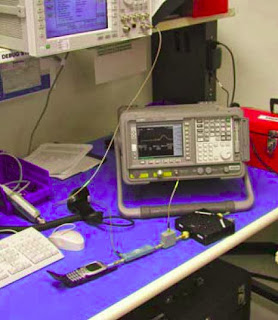The Twitter message from New York Times editor Damon Darlin came minutes after the Federal Aviation Administration began a news conference announcing a change in policy on electronic devices on airplanes. Darlin pinned the credit for switch to a Times reporter. "And thank you Nick Bilton," his message to me read.
Many, many people are like Bilton, Darlin and company, thrilled that the FAA has promised to streamline "the approval of expanded PED use by giving airlines updated, clear guidance." Though each airline will continue to decide for itself, how and when it will allow passengers to use PEDs, the FAA is making it clear, it won't be an obstacle anymore. Within hours, Delta Air Lines and JetBlue filed for FAA approval of expanded use of gadgets on their flights.
As I've written many times, both for the Times and for this blog, electronic devices interfer with airplane systems. In the report on which the FAA based its new policy, the panel of experts reiterate that much remains unclear about the impact of EMI emitting devices on air safety. Here are five of the many alarming points made by the FAA's advisory committee.
Those troubles and more, however, had to be balanced against a population of travelers who did not believe the worries were real and voted with their power on buttons.
Whether the electronics and inflight entertainment industry pushed their agenda I can't say, though Bilton quoted them many times. The Washington Post's Lydia DiPillis suggests that Amazon executive Paul Misener was a questionable choice to head up the FAA's advisory committee. (This took considerable courage since her new boss is Amazon chieftan Jeff Bezos.)
![]()
DiPillis' worry, that scientific ethics could be compromised by putting someone with a financial outcome in the decision in charge of fact finding could be true. Except, it doesn't appear that the committee's alarming conclusions were squelched at all. Reasonable people reading the report have to wonder, "Is this really a good idea?" (See points made above, or read the report yourself by clicking here.)
The fact of the matter is that the facts don't matter. With a report that suggest safety issues exist the FAA welcomes the widespread use of devices on airplanes. The science takes a backseat to other factors that are social, political, economic and logistical.
So now we have an outcome. Whether its a good or a bad one, remains to be seen.
Many, many people are like Bilton, Darlin and company, thrilled that the FAA has promised to streamline "the approval of expanded PED use by giving airlines updated, clear guidance." Though each airline will continue to decide for itself, how and when it will allow passengers to use PEDs, the FAA is making it clear, it won't be an obstacle anymore. Within hours, Delta Air Lines and JetBlue filed for FAA approval of expanded use of gadgets on their flights.
As I've written many times, both for the Times and for this blog, electronic devices interfer with airplane systems. In the report on which the FAA based its new policy, the panel of experts reiterate that much remains unclear about the impact of EMI emitting devices on air safety. Here are five of the many alarming points made by the FAA's advisory committee.
- The potential for interference depends on the aircraft, its systems and the PED.
- Even newer aircraft have sensitive receivers that may be vulnerable to emissions from PEDs.
- Some ground based navigational aids may be as receptive to interference now as they were in the 1960s
- Navigation assistance for ILS approaches may also be impacted
- Devices transmitting a signal like Wifi or Bluetooth, that can generate spurious signals, are an even greater concern.
Those troubles and more, however, had to be balanced against a population of travelers who did not believe the worries were real and voted with their power on buttons.
Whether the electronics and inflight entertainment industry pushed their agenda I can't say, though Bilton quoted them many times. The Washington Post's Lydia DiPillis suggests that Amazon executive Paul Misener was a questionable choice to head up the FAA's advisory committee. (This took considerable courage since her new boss is Amazon chieftan Jeff Bezos.)

DiPillis' worry, that scientific ethics could be compromised by putting someone with a financial outcome in the decision in charge of fact finding could be true. Except, it doesn't appear that the committee's alarming conclusions were squelched at all. Reasonable people reading the report have to wonder, "Is this really a good idea?" (See points made above, or read the report yourself by clicking here.)
The fact of the matter is that the facts don't matter. With a report that suggest safety issues exist the FAA welcomes the widespread use of devices on airplanes. The science takes a backseat to other factors that are social, political, economic and logistical.
So now we have an outcome. Whether its a good or a bad one, remains to be seen.

